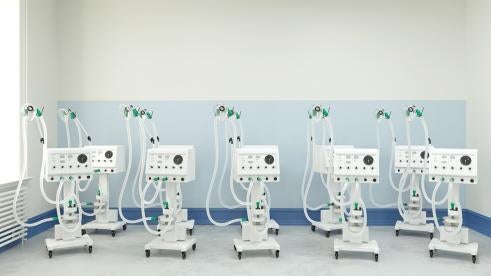On March 18, 2020, the President issued Executive Order (EO) 13909, entitled “Prioritizing and Allocating Health and Medical Resources to Respond to the Spread of COVID-19,” thereby invoking the Defense Production Act of 1950 (“DPA”) in the fight against the COVID-19 pandemic. In a nutshell, EO 13909 delegated to the Secretary of Health and Human Services (HHS) the authority to set priorities and allocations for health and medical resources that are necessary to combat the spread of COVID-19.
On March 27, 2020, pursuant to EO 13909, the President issued a “Memorandum for the Secretary of HHS,” pertaining to the production of ventilators by the General Motors Company (GM). Specifically, the Memorandum set forth the following directive:
The Secretary [of HHS] shall use any and all authority available under the [Defense Production] Act to require General Motors Company to accept, perform, and prioritize contracts or orders for the number of ventilators that the Secretary determines to be appropriate.
Though the President’s directive is clear, what it means for GM is far less so.
The Health Resources Priority and Allocation System (HRPAS), codified in 45 CFR Part 101, sets forth the rules that the Secretary of HHS must follow when exercising authority under the DPA. The President’s Memorandum appears to direct HHS to issue a “rated order” (i.e., a prioritized contract) to GM, demanding production and delivery of ventilator systems by certain set dates. HRPAS, however, explicitly permits GM to reject any such order under any of the following conditions: (i) it is unable to fill the order by the specified dates; (ii) HHS is “unwilling or unable to meet regularly established terms of sale or payment”; or (iii) “the order is for an item not supplied or for a service not capable of being performed.”
According to published reports, GM does not now manufacture ventilators, and its negotiations with HHS have largely centered around the cost and schedule of retooling one of its factories so that GM can start production of ventilators, which it would then sell to the government at cost. If true, the President’s directive will have little legal affect on HHS’s negotiations: because GM cannot now fulfill any order for ventilators, it can reject any priority order issued by the Secretary of HHS pursuant to the DPA. In short, HHS cannot order GM to produce and deliver—on an expedited basis or otherwise—products that it does not now produce.[1]
The President’s March 27 Memorandum demonstrates the government’s willingness to issue orders and directives pursuant to the DPA. However, such procurement orders (as distinguished from allocation orders) can only do so much in the face of limited industrial supplies. Companies receiving such orders must take them seriously and accept or reject them according to the process set forth in HRPAS. But companies cannot be compelled to enter contracts with the government for goods they do not produce, or under irregular terms or conditions.
[1] The DPA does grant the President authority to expend funds to create or expand U.S. industrial capabilities in order to protect our national security, including by purchasing equipment for privately owned facilities. See 50 U.S.C. § 4533. To invoke this authority, the President must make specific findings that were not set forth in EO 13909.




 i
i

